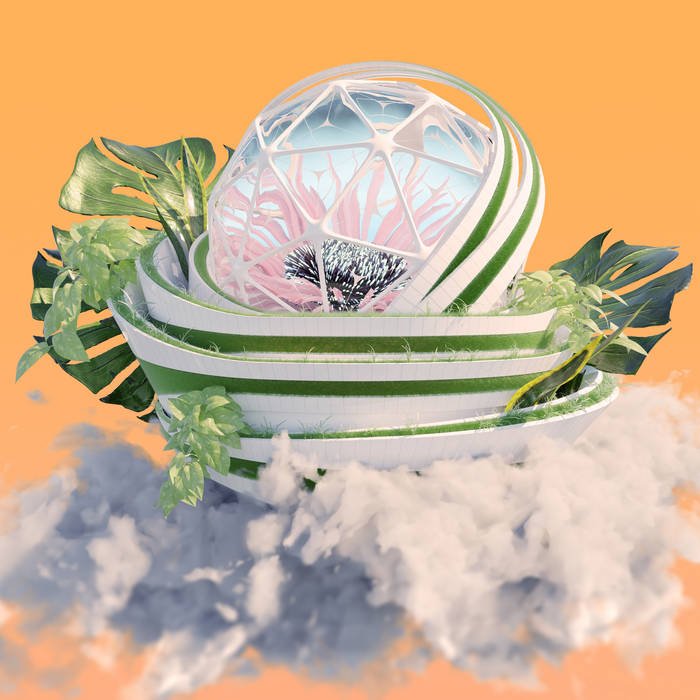by Delia Rainey (@hellodeliaaaaa)
Post-industrial cities create disorienting realities. Old buildings scrape against upcoming gentrification and natural landscapes. There’s a question in the air in these places: are renewal and harmony possible? It makes sense to me that Baltimore band Tomato Flower explore new blossoming worlds in Gold Arc, their debut six-song EP. Tomato Flower formed in 2019 with Austyn Wohlers (guitar, keys, vox), Mike Alfieri (drums), and Jamison Murphy (guitar, vox), with Ruby Mars (bass) joining more recently. Philadelphia label Ramp Local released the EP, and Tomato Flower fits nicely in their collection of East Coast bands redefining whacky indie rock (Buck Gooter, Lily Konigsberg, Birthday Ass, etc). In this brief release, Gold Arc blends accessible poppier songs alongside weirder ones. Tomato Flower’s sound combines a lot of what contemporary experimental rock bands have been doing over the past decade – a cluster of psychedelia, math rock, and a jazz-inspired smoothness.
The concept for Gold Arc is described by drummer Alfieri as “sustainable paradise.” This really reminds me of a documentary called Spaceship Earth. The film is about the 1990s experiment Biosphere-2, where a group of people lived for two years in a geodesic dome meant to replicate earth. They worked together to cultivate the different landscapes inside the giant green-house structure, living off of the food they grew in the temporary farmland with engineered rains. They conducted projects and experiments, and they encountered turmoil from the outside world. Life inside the biosphere feels like a strange dream, and so does the twelve minutes of Gold Arc.
From the start, the EP plays with wider imaginations of what our scenery could be. “Red Machine” features a lounge music serenity, traversing through highways, streets, and fields. Then the chorus splits off into a wide stretch of sustained vocals, with a keyboard ditty like a tropical oasis theme. The odd appearances of “red machines” and “provincial girls” live together, as if the inside and outside of the city have merged into one. The first two songs are the strongest: “World To Come” continues “Red Machine”'s thought on belonging, as Wohlers/Murphy asserts, “There’s a place for me in the world to come.” Organ sounds and sticky guitar alternate against the nostalgic vision of a future that hasn’t happened yet.
The rest of the EP bounces between carefree attitudes and tension. “Truth Lounge” exhibits the latter, listing off what the world could provide: sunlight, firewood, wind. Murphy’s haunting guitar runs into the darker vocalizing and Alfieri’s slashing drums. A squeaky futuristic synth interrupts, emulating natural gusts of wind, the rocky terrain, a messier ending. Back to no-worries elevator-music mixed with steady indie rock, “Lover’s Arc” states “I wanna fall in love with you, all the time…” and then ends. “Stone” turns a seesaw of guitar notes and sweeter vocals into a rickety, addictive melody. In the final song “Shying,” Wohler and Murphy sing a duet, their high-pitched legato vocals turning into clouds. Maybe they are saying “I feel around me,” plucking around like the instruments, rushing towards something.
Gold Arc is a fun first impression for a new band; keys, guitar, or crooning surprise us like discoveries growing in a glass dome. Tomato Flower’s imagining of people living together in gardens and cities seems enticing: an escapist jaunt from our current broken earth of climate change, viral disease chaos, and individualistic capitalism. Maybe I’m over-analyzing their chosen theme, but like the biosphere-dwellers in the documentary, Tomato Flowers’ songs clash into frustration (“Truth Lounge”), just as much as they find easy elation (“Lover’s Arc”). The sounds honor nature (“my garden cruel and beautiful”) and an inevitable loneliness within rural or urban communities (“no one’s ever gonna find you”). It may be satisfying to pin down Gold Arc within a futuristic-idealism storyline, but for me, Tomato Flower exchanges a simpler message that futures can exist at all.

